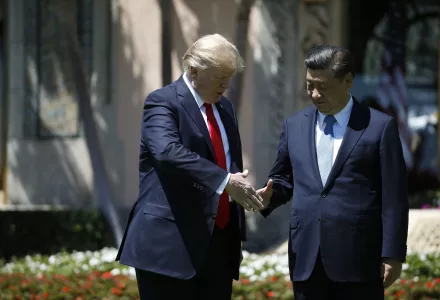
President Donald Trump and Chinese President Xi Jinping reach to shake hands at Mar-a-Lago, Friday, April 7, 2017, in Palm Beach, Fla.
Can Beijing and Washington escape the Thucydides Trap?
WOULD A Chinese leader barely in control of his own country after a long civil war dare attack a superpower that had crushed Japan to end World War II five years earlier by dropping atomic bombs on Hiroshima and Nagasaki? As American troops pushed North Korean forces toward the Chinese border in 1950, Gen. Douglas MacArthur could not imagine so. But Mao Zedong did. MacArthur was dumbstruck. Chinese forces rapidly beat American troops back to the line that had divided North and South Korea when the war began. That thirty-eighth parallel continues to mark the border between the two Koreas today. By the time the war ended, nearly three million had perished, including thirty-six thousand American troops.
Similarly, in 1969, Soviet leaders could not imagine that China would react to a minor border dispute by launching a preemptive strike against a power with overwhelming nuclear superiority. But that is precisely what Mao did when he started the Sino-Soviet border war. The gambit showed the world China’s doctrine of “active defense.” Mao sent an unmistakable message: China would never be intimidated, not even by adversaries that could wipe it off the map.
In the years ahead, could a collision between American and Chinese warships in the South China Sea, a drive toward national independence in Taiwan or jockeying between China and Japan over islands on which no one wants to live spark a war between China and the United States that neither wants? It may seem hard to imagine—the consequences would be so obviously disproportionate to any gains either side could hope to achieve. Even a non-nuclear war conducted mostly at sea and in the air could kill thousands of combatants on both sides. Moreover, the economic impact of such a war would be massive. A 2016 RAND study found that, after just one year, American GDP could decline by up to 10 percent and Chinese GDP by as much as 35 percent—setbacks on par with the Great Depression. And if a war did go nuclear, both nations would be utterly destroyed. Chinese and American leaders know they cannot let that happen.
Unwise or undesirable, however, does not mean impossible. Wars occur even when leaders are determined to avoid them. Events or actions of others narrow their options, forcing them to make choices that risk war rather than acquiesce to unacceptable alternatives. Athens did not want war with Sparta. Kaiser Wilhelm did not seek war with Britain. Mao initially opposed Kim Il-sung’s attack on South Korea in 1950 for fear of blowback. But events often require leaders to choose between bad and worse risks. And once the military machines are in motion, misunderstandings, miscalculations and entanglements can escalate to a conflict far beyond anyone’s original intent.
To better understand these dangers, Washington and Beijing have developed scenarios, simulations and war games. These often begin with an unexpected incident or accident. Individuals assigned to play the hand of China or the United States take it from there. Participants in these exercises are repeatedly surprised to find how often and easily small sparks lead to large wars. Today, there are at least three plausible paths to war between the world’s two greatest powers.
Allison, Graham. “How America and China Could Stumble to War.” The National Interest, April 12, 2017
The full text of this publication is available via The National Interest.





